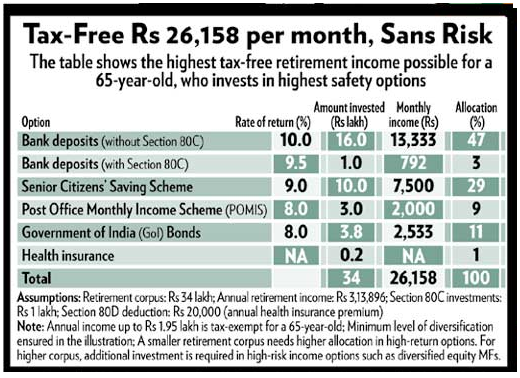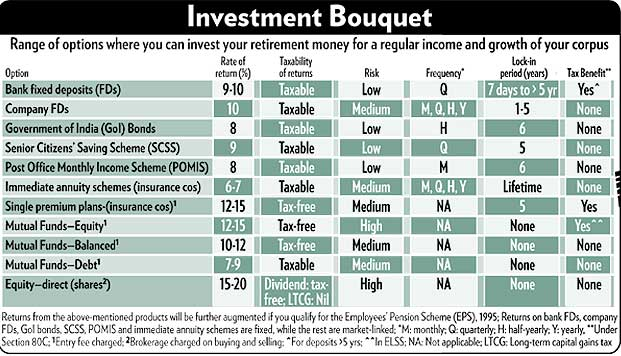|
| Help | |
| You are here: Rediff Home » India » Business » Special » Features |
|
Retirement is like a long vacation in Las Vegas. The goal is to enjoy it the fullest, but not so fully that you run out of money. -- Jonathan Clements, journalist and author In retirement, we dream, we will do the things that the daily whirl does not allow us to�read, socialise, travel, play golf, swim.... The list is long. The reality is, in India, most people in retirement barely manage to maintain their lifestyles. Some run drastically low or completely out of cash, lose their financial independence, and lean on their children for their livelihood.
A big reason why retirement dreams often turn into nightmares is the lack of or insufficient funds to draw on. After all, there has to be enough to create an income stream that can replace the monthly paycheque for two decades or more. Today, the average urban Indian lives for around 80 years, while he still retires around 58. And many have woken up to this financial reality. However, even among this set, most have not figured out how to use the funds to take care of their regular as well as lumpy needs as long as they live. Many begin retired life with a healthy nest egg, but squander away that hard-earned advantage through clumsy handling. So, the other half about achieving post-retirement bliss deals with smart investment of retirement funds. And that is our concern here. We have worked out five strategies that should help you deploy your retirement funds so that they outlast you. Apart from the retired, we expect these to be useful to people with retired or about-to-retire parents. But before we get into the strategies, a quick look at the backdrop in which they have to be implemented. Being Your Own Fund Manager Unless you have a financial advisor, you have to manage your own funds in retirement. This involves a few things. Creating income. You have to do it well enough to not only replace your salary income, but also meet lumpy expenses such as house repairs, without overdrawing funds. After all, you have to make the corpus last your lifetime. Ensuring growth and liquidity. You need liquidity to meet uninsurable expenses, especially those related to health. But you cannot park too much in a low-paying savings bank account. The retirement corpus needs to keep growing so that you have the cash to pop the champagne on your 85th birthday, well beyond the 80 years you were expecting to live. Managing risks. You will have to protect your funds from a host of risks. The first is investment risk. It can be from falling interest rates on fixed income instruments such as bank FDs, or from a sliding stockmarket via monthly income plans of mutual funds (MF) that have equity exposure.
Then there is mortality risk, or the risk of running out of retirement money. You also face liquidity risk, that is, not having enough cash in hand since your investments are illiquid or don't generate income. Next, there is the risk that inflation will erode the purchasing power of your money. Finally, there is taxation risk, where inappropriate investment options lead to larger-than-desired tax flows that will further dent the corpus.
Daunting as it may sound, it is not too hard to make your retirement funds stretch if you are disciplined and alert. The five strategies below should do the job for you. Keep it big Strategy. Depending on your regular and periodic financial needs, invest a part of the corpus in growth-related investments (like equity MFs) even as you deploy the bulk in fixed-income investments. Pune-based financial planner Veer Sardesai says: "Unless you have an exceptionally large retirement corpus, there is no option but to have some equity exposure." Investment options. For equity exposure, you can invest in a balanced fund or a diversified equity MF with a good pedigree, size and consistent performance. For example, MF schemes such as HDFC [Get Quote] Prudence, SBI [Get Quote] Magnum Global and Reliance [Get Quote] Growth. In case of fixed income options, consider bank FDs, Senior Citizens' Saving Scheme, Post Office Monthly Income Scheme, annuities of insurance companies, and debt funds of MFs. "Senior citizens continue to maintain a conservative outlook and, hence, the fixed annuities option is what they usually opt for," says N.S. Kannan, executive director, ICICI [Get Quote] Prudential Life Insurance. This equity strategy has found takers already - 63-year-old A.L. Alagappan from Chennai being one of them. He retired as a general manager from a PSU bank and now works for an American bank in Chennai. While 95 per cent of his investments are in fixed-income options, 5 per cent of the portfolio is in equities, a move that should help him beat inflation. Spread the jam Strategy. Here too, the answer lies in investing a part of the corpus in equity-related options so that the jam of retirement funds lasts till the end of the sandwich of your life. The answer to how much you should invest depends on your regular income needs and risk-taking ability. Delhi-based B. Subba Rao, 80, a retired media professional, and Mumbai-based Farrouk Irani, 58, an ex-banker who took a voluntary retirement in 2001, are two people who have got their retirement funds back on track this way. Throughout his work life, Subba Rao swore by and invested in bank FDs and post office savings schemes such as Public Provident Fund and National Savings Certificates. The faith remained till, a few years back, he realised that inflation and declining interest rates on his investments were eroding his corpus. To rebuild it, he started investing in balanced, as well as equity MFs. Today, the last two make up 10 per cent of his portfolio.
Irani's story runs similar to Subba Rao's, except that he had a much longer retired life ahead when he saw the erosion. His shift has been sharper. Now, 50 per cent of his funds are in MFs. "This is the only way I can make my corpus grow," he says. To make this mid-course correction you need to keep reinvesting the surplus cash that you are left with at the end of every month in equity-related products. Investment options. Ashish Nigam, fund manager, DBS Cholamandalam MF, illustrates the strategy: "If your retirement corpus is Rs 5 lakh, invest about Rs 3 lakh in debt schemes of MFs as they are more tax efficient than bank FDs. Invest Rs 1.5 lakh in equity (diversified and balanced) MFs. The remaining Rs 50,000 should be in short-term and floating rate funds." If you find it difficult to take this suggestion, remember we are talking about exposing just a part of your portfolio to equity. "Some aggressive senior investors do opt for balanced and equity funds, even though it forms a small portion of their portfolio," says Sandesh Kirkire, CEO, Kotak Mahindra AMC. Depending on your risk appetite, you can invest at least 20 per cent of your corpus in MFs, especially balanced and diversified funds. "Choose a fund that has done well over the last 3-5 years, and mix of balanced, diversified and equity funds," says A. Balasubramanian, chief investment officer, Birla Sun Life AMC. When investing in debt, adopt an 'income laddering' strategy. Break up the total amount into smaller pieces and invest them in fixed-income options of different tenures. This creates a regular income stream in the future. Also, spread your investments across other fixed-income options so that this class of investment is diversified and able to withstand interest rate fluctuations better. Get physical Strategy. Consider investing in physical assets such as gold and real estate. These, too, can help you beat inflation and other risks to your retirement funds. "The liquidity issue needs to be considered here," says Sardesai.
Investment options. With the introduction of gold exchange-traded funds (ETFs), you can get the effect of gold investments in your portfolio. Mumbai-based Rajan S. Fadnis, 61, has used real estate to effect. He retired as senior deputy chief medical officer at BEST in 2004. Soon afterwards, he bought land outside Mumbai. "If there is a sudden need for cash, I may sell it," he says. Of the balance, he invested 50 per cent in bank FDs and post office schemes that give him monthly and quarterly returns. Another 30 per cent has gone into MFs and the rest in stocks. That would help him beat inflation comfortably.
Find alternative income Strategy. "People in their early 60s can consider taking up part time jobs in areas such as teaching, consultancy or NGOs," suggests Gaurav Mashruwala, a Mumbai-based financial planner. Fadnis, a doctor by profession, now also works at a diagnostic centre and gets an honorarium. Along with his fixed income investments, the money is enough to cover his regular expenses. Rewards can be higher in post-retirement jobs if you have the skill, experience and inclination to put in the hours as Alagappan's case shows. You can also make a smart move like Delhi-based Mohinder Singh Kainth, 80, a former government employee, who lives with his wife in his own house. He rents out the first floor of his house and this augments his pension. It also allows him to have a decent lifestyle and maintain a car. "My rental income comprises about 20 per cent of my monthly cash flows," he says. You can use your house to augment your retirement funds by tapping the newly available option of reverse mortgage. "Use reverse mortgage only when other resources dry up and liquidity is a concern," says Brijesh Dalmia, certified financial planner, Mandar Financial Services.
Review regularly Strategy. "Senior citizens need to periodically reassess their expenses," says Mashruwala. Just in case you have overshot your budget, you need to figure out the reasons. Investment review shouldn't be followed by knee-jerk reactions. "Don't churn the portfolio excessively as it might create unnecessary risks," warns Nigam. How often should you review? While you can set a periodicity for this exercise, some events would necessitate an out-of-turn review. "Whenever there are changes in inflation rates, interest rates and tax regulations, your portfolio is bound to get affected," says Lovaii Navlakhi, managing director and certified financial planner, International Money Matters. It is then that you must review the scene. American aphorist Mason Cooley wrote: "Retirement requires the invention of a new hedonism, not a return to the hedonism of youth." The five strategies will go a long way in helping you make retirement funds serve you for life and let you invent this new hedonism. With reports from Sunil Dhawan More Specials Powered by  | |||||||||||||||||||||||||||||||||||||||||||||||||||||||||||||||||||||
|
| © 2007 Rediff.com India Limited. All Rights Reserved. Disclaimer | Feedback |

